
..........................................................................................................................................................................................................
one way ticket - nine lives on two wheels. jonathan vaughters. quercus hardback. 369pp illus. £20

i may have used the following analogy on a previous occasion, but since i feel it directly pertinent to that which follows, i hope you'll bear with me if you've heard it before.
let's assume you have successfully applied for a job as a salesperson, visiting clients within a specific region, in order to interest them in a particular range of products. at the end of your first year in the job, you've been particularly successful and your employers have recommended that you apply for the job of sales manager. there is, however, a caveat attached to that recommendation. it transpires that the company's bottom line is substantially augmented by 'under the counter' sales of recreational drugs which you would be expected also to oversee, if your application for the post of sales manager is successful.
as an upstanding, moralistic member of the community, these additional duties are somewhat abhorrent, but refusing to take them on will either entail remaining in your current, lowly-paid position, or possibly even result in you being found 'surplus to requirements'. this is made even harder to accept when you see other sales persons who have been considerably less successful than yourself during that first year, moving further up the corporate ladder, fêted by senior management and in receipt of a remuneration package of which you are extremely envious.
you have the same bills as everyone else, a mortgage and sales skills at which you have worked particularly hard to get to where you are today. so what do you do?
that is the predicament in which a young jonathan vaughters found himelf, but with complications scarcely thought of by the hypothetical sales department alluded to above. 'one way ticket' is his literary catharsis, detailing the early years of a cycling-obsessed american youngster and the conundrum provided by his first steps into the european professional milieu.
vaughters grew up in colorado, the son of an attorney and a teacher of kids with disabilities who were perhaps not entirely enthused by their son's velocipedinal tendencies. however, like good parents, they seemed willing to support their son's ambitions, to the extent of dad vaughters driving an ageing volvo 'station wagon' ahead of a frantically speeding jonathan to offer the aspiring professional some much-needed motor-pacing. but far from an uncle sam and mom's apple pie prelude, ultimately leading to less than savoury tales from the peloton, vaughters introduces the subject of doping as early as page five.
"Clad in US Postal Service team kit and fresh from conquering Mont Ventoux in the south of France, I was clearly much stronger than I'd been as a twerpy eighteen-year-old. But by 1999, I'd also got up to quite a bit of doping."
vaughters has chosen to divide his biography into clearly marked, chronological divisions, beginning with 1986 - 1988 and ending with 2010 - 2019, ending with an epilogue to balance the opening prologue (what else, in a book about cycling?)
'one way ticket' was edited, prompted and cajoled by noted cycling author, jeremy whittle, who has made such an excellent job, that the sole voice of vaughters has been provided with the clarity it richly deserves. the difficult decision' outlined in my opening paragraphs arrived with vaughters' initiation into the life of a european professional. victories and commendable placings had not been hard to come by in north america, leading to the next obvious step up for the obsessed young cyclist.
contacted by a spanish team manager, josé luis nuñez about the possibility of riding for his spanish junior team, subsequent medical tests showed the young vaughters to have a constitution particularly well suited to that of a top cyclist. the potential junior contract was almost immediately upgraded to that of a full professional, an unexpectedly welcome turn of events for the young american. the team was comprised of both spanish and russian cyclists, the latter due to fifty percent of the sponsorship monies arriving from the soviets. for the russians, racing in europe offered, potentially, escape from a much harder life at home, an opportunity of which they were going to make the most.
"Drinking too much from your water bottle was considered weakness. Shifting into the small chain ring was also considered weakness. Eating food was considered gluttonous. The Russians, I discovered, did not fuck around."
vaughters' transition to the professional ranks was, however, far from smooth. eager to repeat his north american successes and inherit his aspirations, he found himself relegated to those who scarcely made the time-cut. how could those impressive vo2 max and haemaglobina figures have resulted in such derisory, non-existent results?
the question is, of course, rhetorical. in 2019, we all know perfectly well how this situation arose. to make matters 'worse', josé luis nuñez' team was operated on behalf of opus dei, a religious organisation, linked to the vatican. rather obviously, their moral and religious obligations precluded any dalliance with performance enhancing drugs, itself a euphemism for 'epo'. vaughters, while initially happy to go along with this philosophy, eventually became disillusioned with not only a lack of results, but also being dropped by riders who were once to be seen floundering in his wake.
'one way ticket' does not paint a pretty picture of the professional peloton in the late 1990s through to 2010, though the endemic doping is dealt a tad less dramatically than that espoused in tyler hamilton's 'the secret race'. not unexpectedly, vaughters' career as a first league cyclist is dealt with in detail, not only the successes and failures, but his self-imposed doping regime. he makes it clear that, while several notable confessors have blamed the team to which they were contracted, for their regular 'medical preparations', vaughters is man enough to accept full responsibility for his actions and of how it altered his perspective of his chosen career.
"Somehow in the mix of morality and disappointment, cycling had turned into something I had to do, instead of something I wanted to do. I was a million miles away from the wide-eyed kid who's motor-paced behind the orange Volvo."
of course jonathan vaughters is every bit as renowned for managing a succession of world tour cycle teams through slipstream sports, a partnership he shares (shared) with investor, doug ellis. i've written 'shared', because it transpires that the current sponsorship by ef education first has resulted in slipstream sports becoming a wholly-owned subsidiary of the sponsor. therefore, the next stage in vaughters' impressive and telling career is currently being written even as we read.
additionally, in his endeavours to try to make things right from the teams' and riders' perspective, he became, albeit unwittingly, the unchallenged president of the association inetrnationale des groupes cyclistes professionels, or aigcp to which it is more commonly referred. on overriding motive for seeking this post was to make things more financially equitable for the world tour teams. then and currently, the organsiders retain all the television rights to the major races and, unlike soccer, for instance, none of those monies are received by the teams on which those selfsame organisers rely to compete in their races.
it's a situation that has not changed in years and seems unlikely so to do. however, on being voted in as president, the outgoing incumbent "Patrick Lefevere came up to me, shook my hand and congratulated me. Then, as outgoing president, he gave me one small, valuable piece of advice. 'You're fucked,' he said. I'm sorry...'
the cynic in me has seriously considered that the bulk of 'one way ticket' could be the author's opportunity to take a stand of moral repugnance over all that took place in professional cycling from the mid-nineties until the end of the last decade. a carefully orchestrated, honours degree in hindsight, if you will. and, indeed, that may very well be the case; however, due to the tone of his narrative and the admissions that hardly place him in a particularly good light, i think this somewhat unlikely.
whatever your opinion of jonathan vaughters, bear in mind that, after rigoberto uran stood on the paris podium, promising him a plethora of better financial offers from other teams, despite the likelihood of the team folding due to a lack of a sponsor (again), he and the majority of the team were willing to stand by their boss while he continued the search for a new sponsor. loyalty such as that is rare in professional sport and even rarer in cycling. aside from the much-vaunted revelations and animosity towards a certain mr armstrong, 'one way ticket' is an excellent and utterly compulsive read.
thanks to the generosity of quercus editions, i have one copy of 'one way ticket' by jonathan vaughters, to give away to the sender of the first correct answer chosen from a (clean) argyle sock.
'what scottish-based motif has featured in virtually every team operated by slipstream sports?'
send your answers to brian@twmp.net, including a full postal address to which i might send the prize if you win. closing date is saturday 6 july.
monday 1 july 2019
 ..........................................................................................................................................................................................................
..........................................................................................................................................................................................................the yellow jersey; le maillot jaune - peter cossins. yellow jersey press hardback 320pp illus. £25

it would be foolish to deny it, but the very reason that the background colour of thewashingmachinepost is the shade that it is, was brought about by way of testament to the tour de france yellow jersey. on occasion, i've attempted to alter the colour to pink during the giro d'italia, but so doing seemed just a tad superficial. so yellow it remains.
the self-imposed contradiction is that i spend those three weeks in july each year, deliberately avoiding making any comment on the velocipedinal happenings across the channel. this is not intended as criticism or disaffection with le tour, but more by way of occupying a niche that offers respite from the wall to wall prognostications, punditry, commentary and general overkill that follows the grand départ. and though i feel the tour might be in danger of becoming a parody of itself, the race is an unavoidable focus of the racing season.
the latter is not necessarily an opinion exclusive to yours truly; this excellent book by the renowned peter cossins would appear to concur. according to french rider, romain bardet "Everything always reminds you of the Tour. In the morning, you can't take a step without someone talking you about the stage the day before and the one just ahead. [...] You open your phone and you're delighted to have a message from the mates that you've not seen for ages, but what do they want to talk to you about? The Tour."
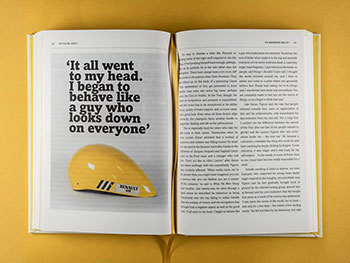
with no disrespect to mr cossins, given the number of words that have been used to expound the history of cycling's biggest annual event, the prospect of reviewing a book ostensibly concerning only the jersey provided to each day's leader of the race, scarcely held a great deal of attraction. what more could the reader learn that had not already been told several times at the 100th running of the event a few years ago? in so doing, however, i grossly underestimated the skill, tenacity and downright expertise of the author. 'the yellow jersey' is a truly marvellous and well-illustrated read.
that opinion is not solely restricted to mr cossins' accomplished narrative, but is also extended to the book's design. the page width mitigates against the standard single column for ease of reading;the choice to feature a two column page is well judged, preceded by a chapter opening, three-column page. pull quotes are inserted in large, bold letters and each chapter heading is every bit as bold. it's rare, within modern publishing, to offer such graphic boldness, in this case, contained within padded front and back covers with a sewn-in yellow (what else?) bookmark.
allegedly, the idea of a leader's jersey was suggested to race progenitor, henri desgrange, by the peugeot team boss, alphonse bauge. though the jersey is reputed not to have appeared until the tour of 1919, its instigation was to help the roadside public identify the race leader midst the drab apparel of gents who had ridden through dust, dirt, mud and dark evenings.
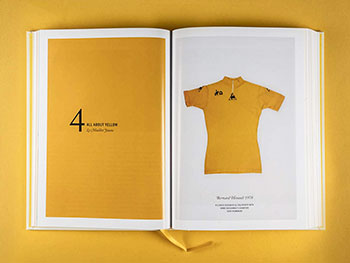
"Good heavens, perhaps it is a good idea, says Desgrange... but what colour should this jersey be?
"I don't know, replies Bauge... but off the top of my head, if I were in your position, I would ensure...having a jersey that's the same colour as the paper in your newspaper."
according to an illustration on the cover of the august 1919 issue of 'la vie au grand air', the leader's jersey took on a mustard yellow hue, a far cry from the canary yellow edition presented on contemporary podia. but why would the simple act of providing a yellow-coloured jersey for the current leader of the tour, make any appreciable difference to those striving for victory in paris? surely a victory is a victory independent of any associated colour? in short, those questions form the basis of peter cossins' thorough and intriguing quest for answers.
perhaps, philosophically, we impose unnecessary weight upon the jersey, when the answer is more naturally emotional than existential. according to one of its most illustrious wearers, eddy merckx "It takes me back to summer holidays when I was a kid. Yellow is the colour of the fields blasted by the sun around the village...where our grandparents farmed."
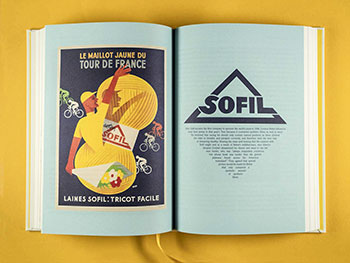
however, the jersey comes with far more karma than the rural idyll described by eddy. through the course of the book, the author investigates the implications of yellow, whether team sky's formulaic riding has undermined the jersey's greater value, whether its definition weakened in the 1956 tour, won by roger walkowiak without so much as a stage victory, what the yellow jersey means to the host nation and their constant and impatient quest for a successor to bernard hinault, and lastly, asks what the future might hold for le maillot jaune.
this is offered as but a mere précis of the author's thoroughness.
it's a narrative that holds as many twists and turns as le tour itself, possibly leaving more questions than answers; precisely as it should do, in my opinion. but this well-illustrated journey is worth every minute invested by the reader. with a publishing date but a week or so ahead of the 2019 brussels grand départ, even the slowest of readers will likely have reached the podium on page 320, such is the compulsive nature of mr cossin's story-telling. if, like me, you thought the tour to have lost a smidgeon of its allure, the yellow jersey makes an excellent job of restoring our faith.
the yellow jersey, by peter cossins, is published by yellow jersey press on thursday 27 june.
wednesday 26 june 2019
 ..........................................................................................................................................................................................................
..........................................................................................................................................................................................................cycle touring in wales - richard barrett. cicerone press paperback 234pp illus. £12.95

geography was never a subject at which i was much use. rather than learning about the locations of towns, cities and rivers etc., the lessons seemed more concerned with educating us as to the gross domestic product of small african nations, the socio-economic consequences of an itinerant population and meteorology affecting the disparate regions living under a unilaterally-named country. given that at least two of the foregoing are highly likely to be the subject of constant change, there was a greater than evens chance that those statistics would have altered by the time we'd left school.
what i did excel at, and a skill that made me highly popular with my classmates, was an innate ability to draw clearly legible maps. this became a highly tradeable feature that greatly assisted my chances of achieving a decent result come exam time. or at least, i naively hoped that would be the case. suffice it to say, my geographical studies came to a sudden halt past third year. happily, my map-making expertise has flourished in the intervening years, and still contributes to my present-day income.
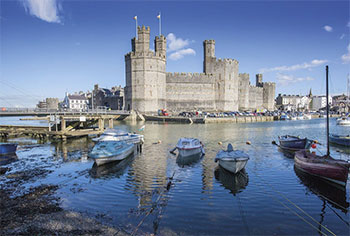
however, when location-specific queries arrive, i rely solely on google maps for my edification.
thus, despite the country of wales being a composite feature of the united kingdom, if asked to hang the donkey's tail to indicate cardiff on a map, i can almost guarantee that tail would be mislocated. thankfully, were i about to undertake a cycling trip to cymru, richard barrett presumably achieved higher grades in geography than did i.
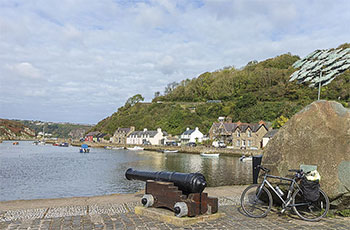
at just under 21,000 square kilometres, there's a great deal of wales to traverse by bicycle, should the choice to do so have been exercised. no matter whether you have in mind a fully-loaded touring trip, an excursion into the trendy world of backpacking, or simply a day out in the welsh countryside, this excellent cicerone guide has pretty much every base covered. and as we have come to expect, the opening pages of this compact and bijou introduction to cycling in wales are decicated to making you more than just wise before the event, not least as to when would be the best time of year to ride.
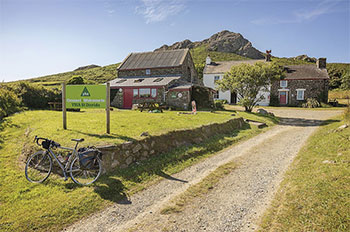
however, though it may be a wholly constituted, individual country, wales is still a part of the british isles and thus susceptible to the meterology suffered by the rest of us. mr barrett therefore advises visiting between the months of april and october. unless, of course, you're from the west of scotland, in which case all twelve are probably fair game. bikepackers will probably be happy to bivvy at suitable points along the way, while tourers and day trippers might be happier with a few home comforts. rest assured the topic of accommodation is suitably addressed.
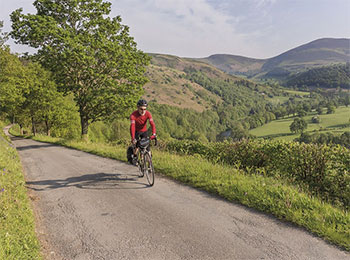
the whole purpose, however, of cycling across or round any particular location is surely the attractions that can be seen en-route. here's where cicerone guides earn their well-commended reputation. mr barrett's parcours commences in cardiff, heading south-west to the intriguingly named 'the mumbles', near swansea. aside from being remarkably well delineated on accompanying maps, there are frequent 'asides' to advise the pedalling traveller of the sights passing their handlebars. such as st. donat's castle, for example.
"The American tycoon William Randolph Hearst purchased the medieval St Donat's Castle, now the Atlantic College, in 1925 and visited annually until 1936, typically with an entourage of film stars and famous politicians."

given the nature of the book, offering as it does, the chance to undertake single, or multiple day bike rides, there's the singular question of how to get to your chosen start point, without possibly havingto ride there in the first place. thanks to the existence of more than just a few railway stations, it's possible to access the vast majority of barrett's guided rides by train. the introduction makes planning the latter somewhat of a doddle, by way of a clearly defined graphic illustrating the proximity of railway stations to multiple grand départs.
as ever, the size of cicerone's cycling guides is well judged, fitting easily into one of your jersey's three rear pockets, or under the clear plastic afforded by a touring bar bag. additionally, the book's format describes not only a circumnavigation of the country, but, alternatively, several shorter routes criss-crossing from west to east (or vice versa). though you'd be forgiven for thinking that the present-day emphasis is on more extensive cycle-touring in distant countries, far, far away, there's still a great deal to be gained and enjoyed by staying closer to home as you enjoy the touring milieu.
just don't ride round wales without this guide book about your person.
tuesday 25 june 2019
 ..........................................................................................................................................................................................................
..........................................................................................................................................................................................................the rough-stuff fellowship archive. adventures with the world's oldest off-road cycling club. isola publishing hardback 207pp illus. £30

as is the case every sunday morning, those of us almost within shouting distance of each other in bowmore village, meet up at the crossroads on main street, to head north(ish) then southwest to debbie's for the grand départ. yesterday morn, on the way out of the village, one of the now ubiquitous motorhomes was parked up adjacent to the last (holiday) cottage on the left side of shore street. hanging on a rear bike-rack were two brightly coloured, modern mountain bikes, presumably to aid their owners in the quest for an active holiday break.
with the weather being uncharacteristically warm and eventually sunny, though still with the stiff headwind that pervades pretty much every month of the year, we opted to perambulate loch gorm on a road that not only passes kilchoman distillery, but leads us past saligo bay, on islay's atlantic coast. it was a similar route to that i undertook the previous day, and where there would usually be substantial waves breaking on saligo shore, due to the direction of the weekend wind, the waters were pretty much flat calm. something of a disappointment, i'd imagine, for the couple unloading surfboards from the roof of their volkswagen estate.
it's not at all unusual to witness mountain bikes on bike racks, for the legendary wide-open spaces to be found pretty much all across the island, apparently promise, if not encourage, those with more of a sense of adventure than the average road peloton. sadly, the promise remains more or less unfulfilled. most of those wide open spaces, while relatively easily accessible, do not lend themselves to being joyously ridden by even state-of-the-art mountain bikes.
however, it seems that the occupants of the aforesaid motorhome were perhaps not as active as the presence of the bicycles would suggest. for, despite the highly clement weather conditions, not only had the motorhome not moved one centimetre, but both bikes were precisely where they'd been when we'd left earlier that same morning. perhaps the possibility of rough stuff was less enticing than they'd thought?
but mountain bikes, whether comprised of 26", 650b or twenty-niner wheels are the current end of the road, rather than its genesis, preceded by quite a number of years by the rough-stuff fellowship. it's an organisation born in the mid-fifties "To bind together in understanding fellowship those cyclists who love to wander off the beaten track of Moor, Fen, Wold, Down, and the ancient drove roads and tracks in the high hills." in 1954, liverpudlian bill paul sent a letter to both the bicycle and cycling magazines calling for other rough-stuff aficionados to join him in a fellowship.
in may 1955, 40 cyclists answered the call at the black swan hotel, leominster, and the rough-stuff fellowship was born. however, ever since the arrival of the safety bicycle in the late nineteenth century, there had been those keen to take the new invention off what, at the time, passed for the beaten track. it's a trend that continues to the present day, but it's unlikely that contemporary members of the fellowship could surpass their predecessors in documenting their often extensive travels.
this marvellous book, curated by max leonard and myfanwy vernon-hunt, exists as the result of kickstarter funding, contributors to which are listed in the latter pages. it documents days long past, via an incredible array of images, the likes of which will probably not be surpassed by even the plethora of digital photographs that pervade every nook and cranny of modern existence. the book arrived with a sew-on patch proclaiming 'i never go for a walk without my bike', the fulfilment of which can be seen in almost all the images within this excellent book.
though the rough-stuff fellowship is ostensibly a gathering of cyclists in thrall to riding across wild countryside, the vast majority of those images depict the bicycles being pushed, carried, and hauled across the least bike-friendly territory of which you could conceive. this includes the summit of mount snowdon, through deep snow at grindleton fell and the khumbu glacier in the himalayas. all these escapades and more were undertaken on lugged steel touring bikes, with tyres featuring decidedly heavier treads than those seen in the tour de france. and though it will surely do little other than cement my reputation as a luddite, there is great joy to be gained from viewing the brake cables exiting the top of the brake levers.
it's undeniable that every last page of this book is indulgent nostalgia, but in truth, it's a great deal more. it documents an age that coincided with the end of wartime petrol rationing and the subsequent rise of the personal motor car. it was a time when exploration of the less accessible corners of the world by bicycle was arguably greater than is the case today, yet apparently not regarded as anything greatly out of the ordinary. adherents of the rough stuff fellowship were probably seen as eccentric as opposed to the cool factor that classifies today's mountain bikers. it's a fellowship that still exists today; if this book engenders likeminded notions, the web address is but a click away, below the end of this review.
but for even the less adventurous, such as yours truly, it is no less of a recommended purchase for anyone who considers themselves a cyclist of whatever affiliation.
the rough-stuff fellowship | buy the book
monday 24 june 2019
 ..........................................................................................................................................................................................................
..........................................................................................................................................................................................................chasing lines by james mclaren. lulu publishing paperback. 216pp illus. £13.57

at the start of this year's islay whisky festival, as reported in these very pixels, i participated in the second ever tour de islay, visiting each and every one of islay's nine distilleries in a single, wet and windy day. i thought i had acquitted myself particularly well by riding the 21 kilometres from bowmore to ardbeg for the start, considering my pelotonic colleagues had all arrived by car. all, that is, apart from one stalwart, who had driven from glenrothes in fife, to kennacraig to catch the 07:00 islay ferry. he then cycled the five kilometres from the ferry port to ardbeg. that pretty much put my own efforts into a greater perspective.
naturally enough, all those folks who ride around the world, or from top to bottom of a continent cover distances well in excess of anything i might manage over an average weekend on islay; i am not given to straying farther afield very often. then, there are those possessed of more competitive genes, those who undertake hundreds of kilometres with the need to complete the distance within certain time limits, either for personal reasons or to satisfy the folks at the guinness book of records. one such gent is james mclaren, whose journey by bicycle across europe, started in ufa in russia, and encompassed just under 6,300 kilometres across nine countries.
the results of his travels (and you'll have to read it to find out if he nabbed the record) fill the 216 pages of chasing lines, a record of all that befell him and his bicycle en-route to southern portugal.
though there have been several recorded rides by cyclists totally unqualified for the trips they undertake, james mclaren was no bright-eyed newbie to the concept of travelling substantial distances by bicycle. but it's possible that his mechanical appreciation of the machine that took him across the andes, might have been a tad less than you'd hope for. as he states in the opening chapter "Thirty miles into the first day, I had axle issues. Luckily, I managed to get it repaired by a young lad in the smallest bicycle shop I had ever seen. Still, I couldn't help but think, was I not supposed to pull the wheel's axles out when I dismantled it to box the bike?"
though i'm pretty darned certain i will never attempt anything like james mclaren's journey, if i was about to do so, i think i'd have been keen to acquire as much mechanical knowledge as possible. this technical innocence reared its head during the early days of his european trip, after having had the transmission seen to in a small bike shop. the latter did not have a ten-speed cassette in order to renew the chain and sprockets at the same time, but the mechanic had attempted a fix nonetheless. however, in tehe kilometres following the 'repair, mclaren had doubts about its efficacy.
"I quickly realise the gear cable hasn't been put back correctly! It's not in a carrier under the bottom bracket of the frame and so isn't held in place. The twangs must have been from it rubbing on the front cassette. (sic) What to do now, I have no idea. [...] I look it over and see that the cable has to be taken off the rear de-railure (sic) and re-thread the right way, brilliant. Not having ever done this before I'm worried. I had a pair of pliers and multi-tool. Thank God for those pliers."
and it wasn't only mechanical troubles that inflicted themselves upon his extensive ride. having experienced knee-pain prior to his departure, an ailment he thought to have been suitably remedied, it flared up again only a matter of days into the ride, necessitating, at one point, pedalling only with his good leg. had this been a normal ride through europe, it would have been entirely expedient to have taken a couple of days off in the hope that the pain subsided, but with a record attempt, there's really no such thing as a day off. to add to his woes, the visitor's visas he held were date sensitive and he had little idea of the consequences should he have remained in russia past the expiry date.
"I'm going okay then my quad shoots a pulse of pain down my leg. It's a lot worse than before, and it starts throbbing to the point where I can't use it at all. I struggle to unclip my shoe from the pedal, as the motion is agony, even without the force going through my leg. I continue with the left leg out in the air and the right leg pedalling, praying it will calm down but this is bad now, it won't work. I last for two long miles with the right leg tiring and sore."
mclaren's is a story well worth the telling, one that serves not only as a narrative of this major undertaking, but one that could easily serve as a manual for those considering any form of long distance cycle, record or otherwise. it's well-paced, with little in the way of lulls in the action, but it does prove that the more you write, the better you become at writing. the opening chapters demonstrate this in stark detail, where punctuation, grammar and a tendency to slip continuously from past tense to present tense indicate that editorial assistance might have been worth considering. however, the intricacies and straightforward strength of his story, mostly transcend the omission of any literary niceties.
nowhere is this better demonstrated right at the start. where others may have been inclined to narrate the trip from home to start in greater, yet probably unnecessary detail, mclaren gets straight to the point. "It was a great feeling to have landed in Ufa, gotten the bike and made it to the hotel." perhaps i could learn something from his brevity?
grammatical and pedantic concerns aside, this is a fine read for armchair and long-distance cyclists alike. the author's enthusiasm and tenacity shine through each chapter, even when under duress. he's a better man than i, gunga din, and with a book to prove it. your summer reading sorted.
sunday 23 june 2019
 ..........................................................................................................................................................................................................
..........................................................................................................................................................................................................the eyes have it

my daughter stays on the outskirts of glasgow, several train stops from either glasgow's central or queen street low-level stations. though glasgow is the place of my birth, i'd be fibbing if i said the scenery en-route to my eldest offspring was particularly inspiring, comprised as it is of housing and the occasional industrial site. and, at the risk of stating the blazingly obvious, the grass verges alongside the city's commuter railways are a far cry from emulating kew gardens.
that's not to say, however, that the surroundings are not worthy of comment. as one domiciled in the country, the comings and goings of the city hold a certain fascination, though not sufficient to have me wish to live in their midst. in this, it seems i am in a tiny minority, for no matter at one time of day, week or month i board a scotrail train, those already occupying seats are, almost to an individual, glued to their mobile phones. those with headphones or earbuds, i presume are listening to music, a pastime with which i can identify, but having done precisely the same en-route to glasgow in the first place, i'm generally inclined to place my ipod in a pocket. phones, on the other hand, apparently need to be looked at throughout the listening process.
others make no pretense of havng itunes switched on, either flicking through screen after screen, or asking someone on the phone to take the chicken out the freezer and they'll peel the potatoes when they get home. i do seriously wonder what folks did before the advent of the iphone and its imitators; its ubiquity has become overhwelming to the point of distraction. when i was a youngster, nothing was allowed at the table apart from food and cutlery. nowadays those have been augmented by a phone sat alongside each place setting, used either to indulge in inveterate texting, or being checked every few minutes in case something of earth shattering importance occured since it was last looked at.
i know i'm seriously over-egging the pudding, but the phone has effectively and single-handedly, killed the art of conversation. and that selfsame device is in danger of killing more than just talk between friends.
four years ago, cycle commuter robert hazeldean, knocked down a pedestrian and rendered her unconscious. he too was made unconscious in the same incident. the victim had stepped out into the road, oblivious of his existence, because she was concentrating on her phone. according to eye witnesses, having cycled through a green light, on noticing the woman ahead of him, he had made every attempt to avoid collision, including blasting an airhorn, shouting and swerving. in spite of his strenuous effort, the collision happened anyway.
the case went to court, with the errant pedestrian suing mr hazeldean for damages. once again, despite eye witnesses telling police that she 'wasn't looking where she was going' and 'the cyclist was not at fault', the judge ruled in her favour and awarded both damages and legal fees, amounting to £21,300. mr hazeldean is employed at a mental health charity and is likely to be bankrupted by this decision, one that i admit, i am struggling to comprehend, particularly since the judge described him as 'a calm and reasonable road user.'
with statistics implying that 95% of uk households are in possession of a mobile phone, their increased infiltration into daily society means that this is the sort of incident that could happen to any one of us. going by the judge's decision, it appears that while absorbed by one app or another and walking into a busy road, with yet little concern for the traffic conditions, the onus is on others to avoid. which, to put not too fine a point on it, is totally nuts. so much for being responsible for our own actions.
as a result, a good friend of robert hazeldean's, brittany maher-kirk has setup a go fund me page to help the unfortunate cyclist pay the substantial costs. these comprise £4,300 in compensation (payable in 14 days), £10,000 to cover the pedestrian's legal fees (they are seeking around £100,000 in costs) and £7,000 for mr hazeldean's leagal costs. naturally , a donation is between you and your conscience, but even a few pounds would help.
imagine if it was you.
at the time of posting, over £24,000 had been raised in a single day, but in the unfortunate occurrence that the final figure is greater than the current estimate of £21,300, donating is still a pertinent option. any amount in excess of the total demand will be donated to 'action aid'
richard hazeldean's go fund me page
saturday 22 june 2019
 ..........................................................................................................................................................................................................
..........................................................................................................................................................................................................the singularity

the world of the mountain bike arguably began with the legendary repack ride in marin county, california, so called because the coaster brakes on the bikes had to be repacked with grease after burn-out on the descent. the bicycles used for the purpose were not recognisable as being related to the current crop of offroad machinery, but predominantly because they were never designed to be used for the purposes deigned by messrs. fisher, kelly and breeze. mountain bikes have changed considerably since those days in the early 1970s; with full-suspension frames scarcely worthy of remark nowadays and the double-diamond frame contorted beyond easy recognition, featuring single chainrings, electronic gear changing and hydraulic disc brakes, descending the repack run in 2019 would probably be considerably less scary and renegade than it was 45 years ago.
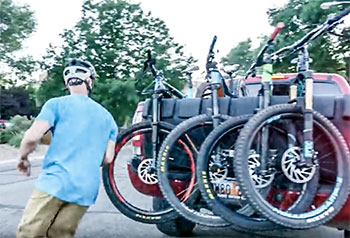
i have no specific interest in mountain biking per se, though i still subscribe to singletrack magazine, predominantly through friendship and respect for the editorial abilities of chipps chippendale. if nothing else, it keeps me technically informed as to the continued differences and similarities between road and offroad. but what cannot be ignored are the wide open spaces depicted in the magazine's copious and sizeable illustrations. if ever there was a reason to be envious of our offroad brethren, this is surely it. island and remotely rural dwellers excepted, the road is often a less than attractive venue for a bike ride.
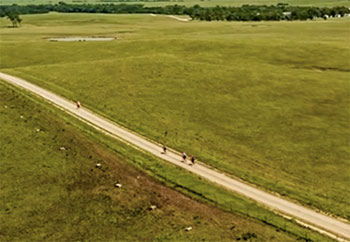
given the subject of yesterday's rant, illustrating the substantial difference between government expectations and commuting reality, if the number of folks on bicycles has scarcely improved over a ten year period, the prospect of sanity for those in thrall to bendy bars and skinny wheels, does not look as promising as it might do. though i have nothing personally against car drivers, there's no escaping the fact that, despite falling car production, there does not seem to be a corresponding drop in traffic on the roads of the western world. so what's an intrepid roadie to do?
my inbox has recently been in receipt of several e-mails from british columbia based anthill films, intent on publicising their latest production entitled 'return to earth'. the most recent of these encapsulated the situation almost perfectly: the antidote to urban saturation? party in the woods. intrigued, i inevitably watched the short trailer linked to the e-mail, which, like several previous trailers begins with a salient message that is as pertinent to mountain bikers as it is to roadies...
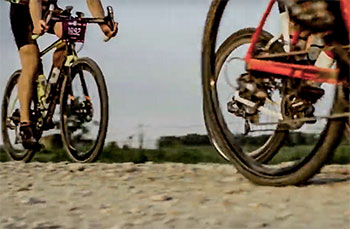
"if watching this is keeping you from riding your bike, here's the entire episode in ten seconds."
in truth, those ten seconds are more likely to have you resolve to watch the full four and a half minutes, even if you've no intention of attempting any of the stunts practised by the trek and shimano equipped riders. riding in the great outdoors, midst wide-open spaces, cannot ever be over-rated, an activity that can only engender a serious level of envy in those of us regularly confined to metalled roads. but cycling life is no longer necessarily entirely black and white.

described on the website as the 'world's premiere gravel grinder' america's dirty kanza has raised its international status in recent years, attracting a number of professional riders more usually associated with road-racing. in particular, ef education first, or at least one or two riders from jonathan vaughters' team. clothing sponsor, rapha, recently featured a short film on their website, following the fortunes and preparations of lachlan morton, alex howes and taylor phinney. to be honest, even though there are few, if any, locations on this side of the pond resembling the dirty kanza parcours, that sort of riding looks highly inviting.
perhaps the means by which the road-going fraternity can enjoy the more laid-back attitude that seemingly goes hand-in-hand with knobbly tyres?
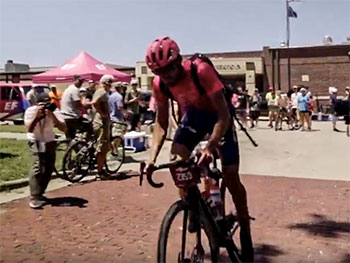
the singularity as related to technology, is the hypothetical future point, where human intelligence and artificial intelligence combine, producing a future that no longer depends specifically on human activity, a theoretical, but no less possible situation, describing humanity's point of no return. the combination of on and offroad at some point in the future may be every bit as inevitable, though the result promises to be a tad less of a nightmare than the former version of the singularity. rapha's recent manifesto, regarding the current state of road-racing and their tentative solution thereof, brought this sort of riding to light, and perhaps, in this case, they were pretty much on the money.
but imperial works' area of concern almost exclusively dealt with the competitive aspect of road-riding, while, at the risk of answering on your behalf, we are more inclined to ride for the sheer fun of it, without any hint of a professional contract. at least two of the velo club are already riding so-called 'gravel bikes', though the offroad aspect currently remains a possibility rather than an reality. perhaps we'll find ourselves at the vanguard of the new wave, simply because we can be.
but we're definitely not losing the three rear pockets, letting the sleeves go floppy and wearing baggy shorts over our bibs. we're not that singular.
dirty kanza with ef racing | anthill films - return to earth
friday 21 june 2019
 ..........................................................................................................................................................................................................
..........................................................................................................................................................................................................missing in action

i am not an inveterate form-filler. when amazon or chain reaction e-mail to ask for my opinion of whatever it was i last purchased, i generally ignore their requests. i seriously doubt that they really need to know my opinion of a sram ten-speed chain, or of the camera battery that amazon wouldn't send to the island in any case. and though i am greatly embroiled in the use of adobe's software, even though they assure me that they really value my comments, to be honest, i figure it's simply an excuse to garner more information that they can use for their future marketing projects.
thankfully, i have no truck with facebook, particularly in the light of their recently announced crypto-currency, a means of payment about which i confess i hold my suspicions. but, in the light of statistics recently announced, perhaps i am being remiss in my duties towards the realm of cycling. according to scotland's transport secretary, michael matheson, the nation is highly unlikely to achieve its target of having 10% of all journeys undertaken by bicycle by 2020. this was apparently the headlining act associated with scotland's cycling action plan announced some nine years ago.
like my peers in the velo club, i am entirely in thrall to the bicycle. i like riding any one of the number sitting patiently in the bikeshed. ask anyone around the principality and they will attest to my fortitude in riding in all weathers, including several occasions when i really ought not to have done so. i no longer own a motor car and have no intention of changing that state of affairs in the foreseeable future. i've reiterated on many an occasion, that i do not live far enough from the office to have need of commuting by bicycle, but in a previous life, in a land far, far away, i regularly cycled several kilometres to work six days a week.
yet, in all this time, despite being a famous member of the cycling media, no-one has ever asked if i get about by bicycle or otherwise. i quick poll of my velo club peers, turns up pretty much the same answer, despite at least two of them being regular cycle commuters. so my question is, how does cycling uk or the scottish government calculate the figures that would indicate they're about to slide well under the target set nine years ago? and to be honest, how did they ever intend to encourage the innocent scottish bystander to adopt the most economic and environmental mode of transport available north or south of the border?
perhaps the answer to the information gathering is a propensity to fill in all those reviews and surveys. maybe that's how they do it.
according to cycling uk's scottish campaigns and policy manager "a great deal of effort has been made by many organisations to encourage more people to cycle." this is the selfsame organisation responsible for overseeing the recently ignored 'national bike week' and the utterly pointless 'national bike to work day' coming our way in august. no doubt there was a good deal of effort put into organising bike week, but on the basis that neither i, or anyone else i know, was aware of its prescient existent, i can only point the finger at a concerted lack of publicity, a feature that effectively undermined all that hard work.
apparently, the amount by which the scottish government will miss its self-projected target, is not a mere sliver; in fact, according to cycling uk, they've not even managed to reach halfway, with scottish bike journeys occupying an embarrassingly low 4%. and despite this being the case, scotland's government has not announced any plans to invest further amounts, in order to achieve its apparently unachievable target. cycling uk once again stated,"(we are) calling for the government to make additional funding available to progress ... the time it takes to lay tarmac on cycle routes and for people to start using them."
the latter expectation is also one that has me a tad confused. i'm well aware of the mantra 'build it and they will come', but i get the distinct impression that both the government and cycling uk figure that offering a few hundred kilometres of segregated cycle track, will immediately result in that magical 10% we're about to miss by next year. what about secure facilities in which to store a potentially expensive bicycle at the business end, or shower and changing provisions? the latter would almost certainly entail discussions with employers, coupled with a soupcon of financial inducement to cater for a cycling workforce.
it's all very well plucking arbitrary percentages out of thin air and placing them on a ten year pedestal of potential achievement, but not only was i unaware of the 2010 prognostication, i have heard not a cheep from any government or cycle agency in the interim. it seems there may be an absence of joined-up-thinking; i reported in march of this year that jacob's engineering consultancy were carrying out a survey concerning walking and cycling provision across the argyll and bute region, a survey paid for with over £300,000 from the scottish government's increased active travel budget. but should a pressing requirement have been identified as a result of this survey, the cash-strapped council have no money to add to their current infrastructure, making this entire affair, something of a pointless exercise.
if government simply advertises an increase in its travel budget largesse, aimed at agencies with a vested interest in improving scotland's cycling/walking provision, then simply sits back to see what happens, i seriously doubt that scotland will add much to that 4%, no matter the period over which it is to be measured. and, at the risk of stating the glaringly obvious, what if there is actually only 4% of scots who want to ride their bikes? did anyone think to ask that question?
thursday 20 june 2019
 ..........................................................................................................................................................................................................
..........................................................................................................................................................................................................potentially precipitative perambulations

obviously, as a famous member of the cycling media and self-appointed expert mechanic, the following has never happened to yours truly, but according to hearsay...
you know those moments when fitting a new tyre and tube and things don't quite go according to plan? for instance, it seems that even tyres with almost smooth rubber, frequently feature directional arrows on the sidewalls. in cases such as this, one or both of the following will tend to occur: having fitted the tyre, inflated it to the desired pressure and refitted it to the bike, you (obviously not me), will discover that the directional arrow is pointing in the wrong direction. even if awareness of those arrows existed prior to fitting the tyre, the tyre will still be fitted incorrectly. there then follows an internal debate as to whether it's really necessary to swap it round; after all, there's no real tread to speak of, so what difference is it likely to make?
however, there's always the nagging likelihood that one of the sunday morning peloton will notice the directional misdemeanour, thus giving rise to wholesale embarrassment on your part. once again, obviously not mine.
but should the above hurdle have been successfully negotiated at time of fitment, part two lurks in the undergrowth, just waiting for the opportunity to trip you up once again. though there is a perfectly sound reason as to why the valve stem ought to be aligned by the tyre's sidewall label, that reasoning has been usurped by a pressing need for velocipedinal style. if you thought the iniquity of being caught with a tyre facing in the wrong direction, it is nothing as to the shame and horror of the valve-stem malfeasance. you can bet your sweet bippy that if your official national cycling body is informed of the foregoing, attempting to renew your annual membership will be fraught with perfectly warranted, public disparagement.
perhaps an extreme example, but overall, this is what is defined as being 'wise after the event.'
loathe as i am to admit it, this past week has brought to light just such an inattentive misdemeanour, related to the annual 'ride of the falling rain', an event which is perilously close to becoming only one month distant on sunday 4 august. i would readily agree that i have been somewhat remiss in publicising said event, but i do have my reasons, mostly to do with maintaining two-digit participant numbers in the face of the continued expansion of interest in sportive riding.
this is a small island, peppered with more than just a soupcon of singletrack roads and with august generally reckoned to be the height of summer, it well behoves the conscientious cyclist to be aware of simultaneously increased motor traffic. but even in the face of this knowledge, anecdotal evidence would tend to suggest that there has perhaps been greater interest in riding the falling rain than in recent years. and while the velo club is always welcoming of perambulatory visitors, we well know the pressure that exists on the island's available accommodation.
thus, making mention of this potentially very wet and very windy event (just ask trevor ward from the guardian newspaper) ahead of the one month to go day of reckoning, has a twofold reason for existence. firstly, assuming you wish to ride, if you have not already booked your accommodation, i would respectfully suggest that you do so. and if you intend arriving by motor vehicle, please make sure you book the ferry at the same time.
for those of you wondering where the 'honours degree in hindsight' enters the fray, with the 21st islay jazz festival taking place this coming september, the 19th cantilena festival heading our way in july and next year offering the 40th running of the jura fell race, i now seriously wish i'd paid attention to when 'the ride of the falling rain', first became 'the ride of the falling rain'.
it could have been 2003 or 2004, but who the heck can remember?
calmac ferries | islay accommodation information
wednesday 19 june 2019
 ..........................................................................................................................................................................................................
..........................................................................................................................................................................................................zilfer cycling/activity wallet

on wednesday evening of this week, i shall be sat behind a red yamaha drumset, doing my level best to emulate the percussive soundtrack to a selection of songs from abba's 'mamma mia'. you will, perhaps, accept my protestations that music such as that promulgated by bjorn and benny, agnetha and anni-frid, is not normally included on any of my ipod playlists, but i have made an exception in this case, purely for the sake of education.
during the school term, i spend a couple of hours a week teaching higher and advance-higher drumming at the local secondary school. this consists predominantly of ensuring that those studying drumset at this level, can confidently play prescribed parts as dictated by the education authority and the head of the music department. though my sight-reading is rudimentary at best, it's good enough to know whether the music is being played correctly, and i've been playing drums long enough to know how to correct any wrongs.
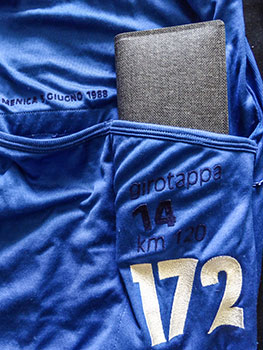
however, by way of extra-curricular musical activity, the school year often features concerts in which the music students are given the opportunity to demonstrate their skills to their peers and the public. this has led to my having to transcribe drum parts, not only for my own playing, but for other drum students; it's not a skill to which i take readily, being many a long year since i last had need of writing 'the dots'. so while the singers and pianist are provided with purhcased scores, the guitarists and drummers have had to figure it out for themselves.
and though i'd rather you kept it to yourselves, transcription was rather fun.
naturally enough, abba's are not the only tunes in town, but they are the ones that directly affect me, and it's hard to deny that the swedes wrote a considerable number of catchy pop tunes. the fifteen minute selection features 'i have a dream', 'sos' and 'dancing queen', amongst others, but a notable exception, in this day and age, is surely, 'money, money, money'; a song whose subject probably affects us all, no less the velocipedinally inclined.

the highest profile example of this directly related to the velo club, would be the weekly sunday ride. though we have stopped short of taking attendance before the grand départ at 10am, those who have made their cycling proclivities manifest over preceding weeks, are generally expected to put in an appearance, unless they have previously made their official excuses. it's one of the main benefits of a group ride; committing to cycle with others on a regular basis, is one of the best methods of staying away from any number of pathetic excuses frequently trotted out by the great unwashed. many have indeed stated that we should be committed, though i've a notion that their definition is a tad different than ours.

this committment extends towards the staff at debbie's. with almost ten cyclists riding on occasion, you can easily imagine the queue of scruffy riders at debbie's cash till, eager to pay for coffee and occasionally cake, when time comes for the journey home. thus, rather than pay individually, there is a loosely constituted, voluntary rota, to take care of business and, rather obviously, to do so necessitates the carrying of either cash or plastic.
i seriously doubt i have to tell you of the iniquities involved in carrying cash and/or plastic in a jersey rear pocket. few shop assistants or baristas will take kindly to being handed swot and hetty cash, particularly now that the most frequently used denominations are no longer made of paper. and placing a solitary debit or credit card in a jersey back pocket is scarcely the most pragmatic means of keeping your considerable spending power entirely safe. what is really required, is a wallet.

oddly enough, the wallet market, should such an entity be deemed to exist, seems recently to have expanded to incorporate the more active lifestyle. like cycling, for example. the lack of such an item seems to have been one that bothered dan bessant three years past, so much so, that he was moved to create the very, waterproof, slimline repository that has inhabited one of my jersey rear pockets of late. not unnaturally, more regular wallet purveyors are often less than conversant with the size restrictions imposed by the average cycle jersey.
many of you will possess wallets that would stretch a rear pocket well beyond its designed parameters, but the zilfer wallet is long and narrow, featuring four internal slots for credit/debit cards and two inside spaces in which to carry cash. for those in thrall to the mobile phone, even when out cycling, away from the trials and tribulations engendered by normal society, there is an angled, waterproof zip, offering access to the entire width of the wallet in which to place a mobile communications device.

however, in order to retain the folding ability of the zilfer wallet, that device would need to fit within half the width, otherwise it will no longer fit in a jersey rear pocket. though i still have no truck with mobile phones, i did find it a simple procedure to have my ipod touch ensconced within. in fact, the aforesaid ipod will also slide easily into one of the cash-carrying internal sleeves. filled with cards, cash and ipod, perhaps the sole downside i came across, is the wallet's propensity to remain open, rather than closed. this could have probably been remedied by either a circumferential zip, or some form of poppered clip to ensure it remains closed when necessary.
of course, keeping the wallet inside the waterproof, string-pull bag in which it arrives, provides a partial solution, but i can think of many, day-to-day situations where the bag will be seen as surplus to requirements, not least because it conceals the zilfer's strikingly simple, practical design from admiring onlookers. suffice it to say, even after an exhilarating bike ride around the rhinns of islay, cards, cash and ipod were not only safe and sound, but remained appropriately dessicated.
the zilfer cycling/activity wallet is available in neo black, or ash grey (as reviewed) at a retail cost of £52.
tuesday 18 june 2019
 ..........................................................................................................................................................................................................
..........................................................................................................................................................................................................